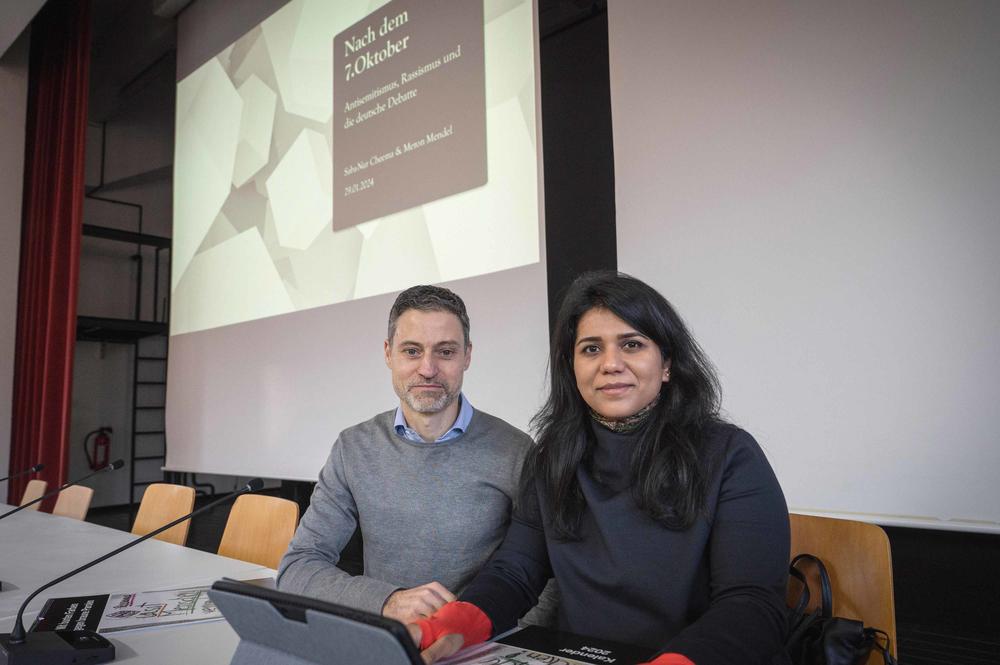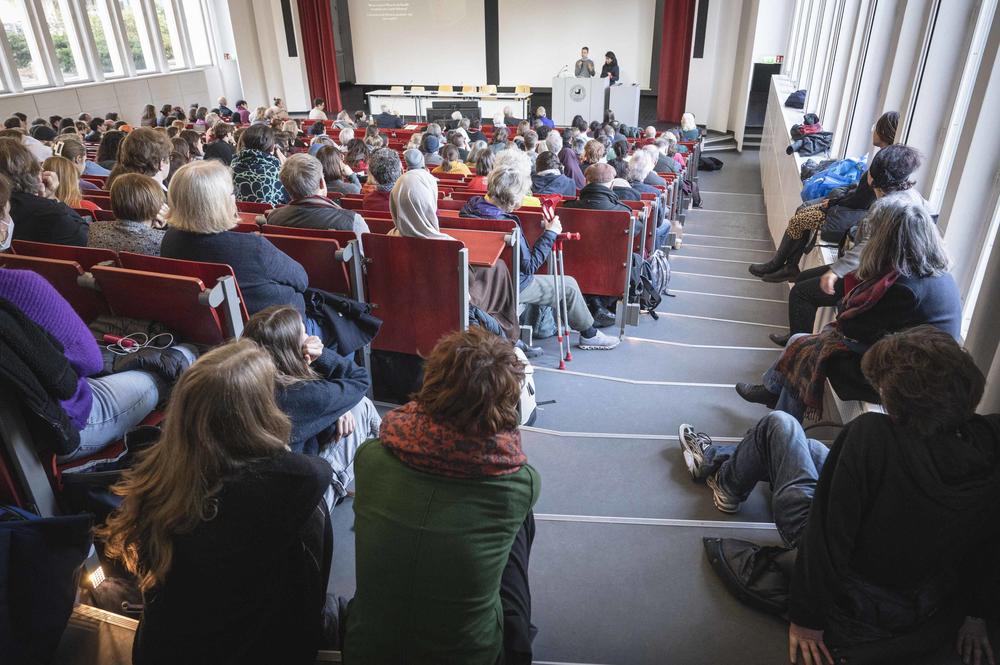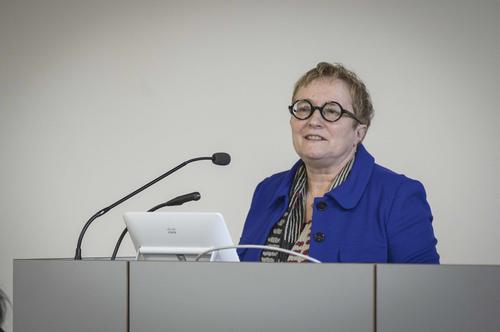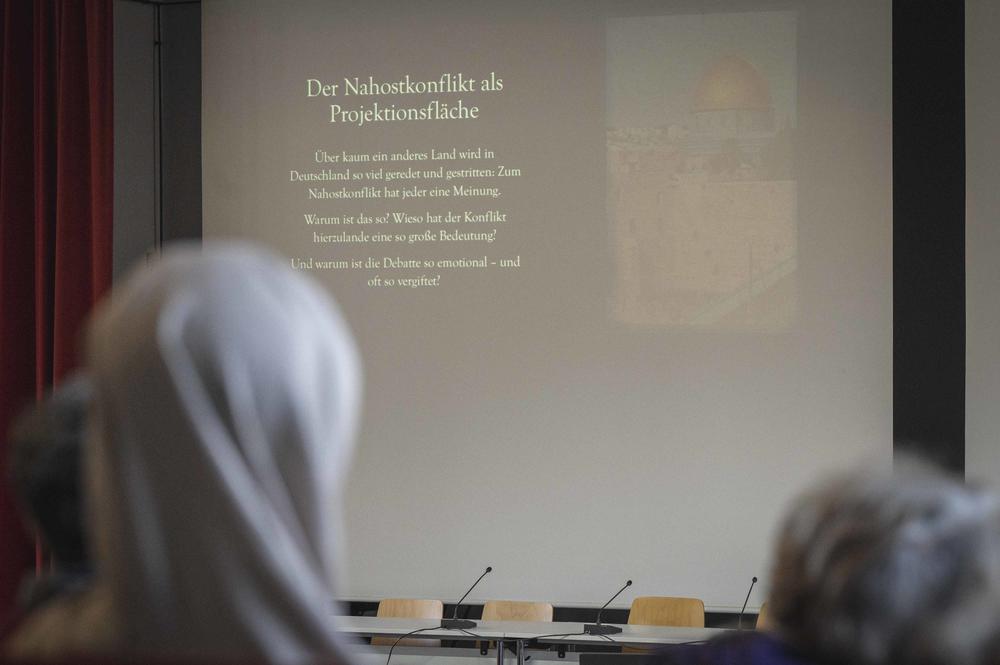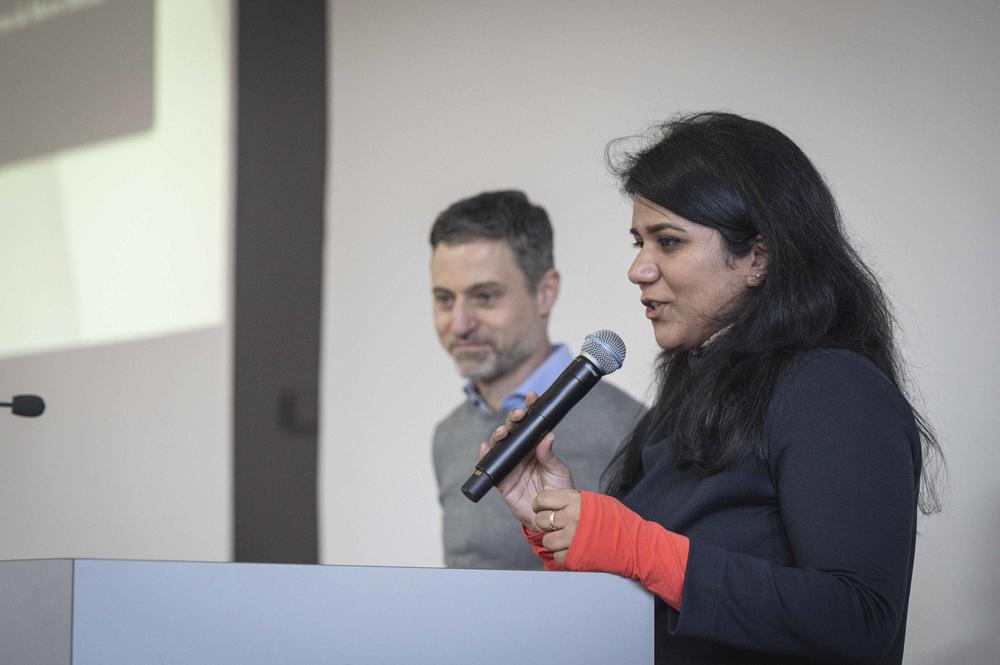Lecture by Saba-Nur Cheema and Meron Mendel: Responses to the Middle East Conflict
Freie Universität Berlin hosts lecture series against antisemitism, racism, and anti-Islamic radicalism
Mar 19, 2024
Advocating dialogue: Meron Mendel and Saba-Nur Cheema held the opening lecture at Freie Universität Berlin on January 29, 2024 to launch the university's event series against antisemitism, racism, and anti-Islamic radicalism.
Image Credit: Bernd Wannenmacher
How have the events of October 7, 2023, affected us? What stances do we take? What does the terror attack by Hamas and the escalating violence in Gaza elicit in us? Why does the conflict in the Middle East provoke such strong emotions among so many people in Germany (which was already the case before October 7, but has now intensified significantly)? Why does the issue elicit such strong responses in people who may have no direct personal relationship to the Palestinian territories or Israel?
A packed house: The event in the lecture hall in the Henry Ford Building was well attended by members of Freie Universität Berlin as well as the general public.
Image Credit: Bernd Wannenmacher
Meron Mendel and Saba-Nur Cheema spoke about these issues on January 29 in the Henry Ford Building of Freie Universität Berlin. There was a great deal of public interest, and the lecture hall with around 350 seats was fully occupied.
These two renowned experts on antisemitism, anti-Muslim racism, and educational work on these topics succeed like few others in understanding multiple and often conflicting perspectives, such as, most importantly, pro-Israeli and pro-Palestinian stances.
Meron Mendel, who grew up in a kibbutz in Israel in the 1990s, has lived in Frankfurt am Main since 2003. He is a professor of social work at the Frankfurt University of Applied Sciences and director of the Anne Frank Educational Center. Saba-Nur Cheema, who grew up in Frankfurt am Main and is the daughter of Pakistani refugees, is a political scientist at the Goethe University in Frankfurt am Main. Meron and Cheema are married to each other, and they write the monthly column “Muslim-Jewish Supper” in the Frankfurter Allgemeine Zeitung. They are important voices in the debate about how best to deal with the reverberations of the Middle East conflict in Germany.
Executive Vice President of Freie Universität Berlin Professor Verena Blechinger-Talcott welcomed Saba-Nur Cheema and Meron Mendel and moderated the subsequent discussion along with Professor Rainer Kampling.
Image Credit: Bernd Wannenmacher
Executive Vice President of Freie Universität Berlin, Professor Verena Blechinger-Talcott, set the stage for the event and the series. She reiterated that, of course, what is happening in Israel and Gaza can provoke a lot of emotions: from sadness to compassion to anger. It can even lead to conflicts in Germany and at Freie Universität. She pointed out that while universities cannot solve the problems of the world, they can help explain them and situate them in different contexts. Universities can also demand explanations and contribute to more enlightened self-awareness. But in order to do all that, Blechinger-Talcott says, they must provide spaces for an open and respectful culture of dialogue.
Outside observers who were following the media coverage of the past few months might have been surprised to see how calm and constructive this public discussion on the Middle East conflict was at Freie Universität. Whether it was because of the speakers or because some time had passed since the attack by Hamas, or whether it was because the mood at the universities is not quite as polarized as presented by some news outlets, the lecture by Cheema and Mendel invited everyone to take time to reflect and look inward. Instead of fueling heated debates, it stimulated thought.
Why does the Middle East conflict provoke such strong emotions among so many people in Germany? This was already the case before October 7, but has since then intensified significantly.
Image Credit: Bernd Wannenmacher
Meron Mendel began by analyzing how the conflict in the Middle East serves as a surface for projections. He pointed out that our opinions and reactions to the issues reveal more about ourselves than about that to which we are reacting. They reveal more about our identity and where we see ourselves in the world. This can also be seen in how strongly the debate about the Middle East conflict agitates people and how heightened their emotions can become, even when they do not have any personal or family relationships with either Palestinians or Israelis.
Mendel argued that the Middle East conflict serves “the function of reinforcing ideas we have about our own position or our identity,” or, in other words, the narrative we tell about ourselves. This is possible because two meta-narratives collide: on the one hand, a post-Holocaust narrative that revolves around what and how we learned from German history. On the other hand, there is a postcolonial narrative that perceives Israel as an outpost of the West in the Middle East and identifies with the “weak” and the “oppressed” against the Israelis, who are supported by the United States and the West. These narratives already existed before October 7, 2023.
Saba-Nur Cheema then explained what form the two narratives have taken in the past four months. On the one hand, there is the criticism that apparently for some people, “Jewish lives don’t matter,” for example, when the brutal massacre by Hamas is cheered by some and ignored by others. Cheema described the opposing narrative as an accusation of “silencing Palestinian voices,” for example, when writers or artists are uninvited, or when schools ban the display of Palestinian symbols or flags.
These two opposing discourses can be found in diverse places throughout the public sphere, from certain pockets of social media where extremely truncated narratives and even incorrect information about the conflict in the Middle East are rampant, to statements made by federal and state ministers who demand that individuals taking on German citizenship be required to make a commitment to Israel, with some even going as far as suggesting that citizenship for people with a “migration background” be revoked. The most extreme manifestations of these entrenched positions include the call for a cultural boycott instigated by “Strike Germany” on the one hand and the so-called “clause against antisemitism in cultural funding” of the Berlin Senate, which was ultimately withdrawn, on the other.
Near the end of their lecture, Mendel and Cheema suggested some principles for a constructive debate. According to them, the ground rules for discussions about the conflict in the Middle East should include a shared commitment to universal empathy; an agreement to recognize both Israel’s right to exist and the Palestinians’ right to have their own state; an explicit rejection of any and all forms of terror and violence and of comparisons with the Nazis; finally, participants must also agree that no party is solely to blame for the conflict in the Middle East.
Saba-Nur Cheema, a political scientist at the Goethe University in Frankfurt am Main, has been working in political education for many years.
Image Credit: Bernd Wannenmacher
The ensuing discussion was just as open and thoughtful as the lecture. Members of the audience asked about role models for a productive culture of discussion, about possible solutions, and about how to successfully deal with sensitive issues. What was noticeably absent at the event: heated debate, polarization, agitation, and verbal insults. This initial lecture set high standards for future lectures in this series.
The original German version of this article appeared in campus.leben, the online magazine published by Freie Universität Berlin.
Further Information
On January 25, 2024, the Antisemitism Awareness Weeks at Freie Universität Berlin started with a lecture on “Intersectionality and Antisemitism – Criticism and New Perspectives,” held by Professor Karin Stögner, a professor of sociology at the University of Passau. Additional events will take place within individual academic departments until the end of the winter semester lecture period. They were initiated by faculty members in the various institutes. The aim is to discuss antisemitism in various public and university events, seminars, and lectures.

